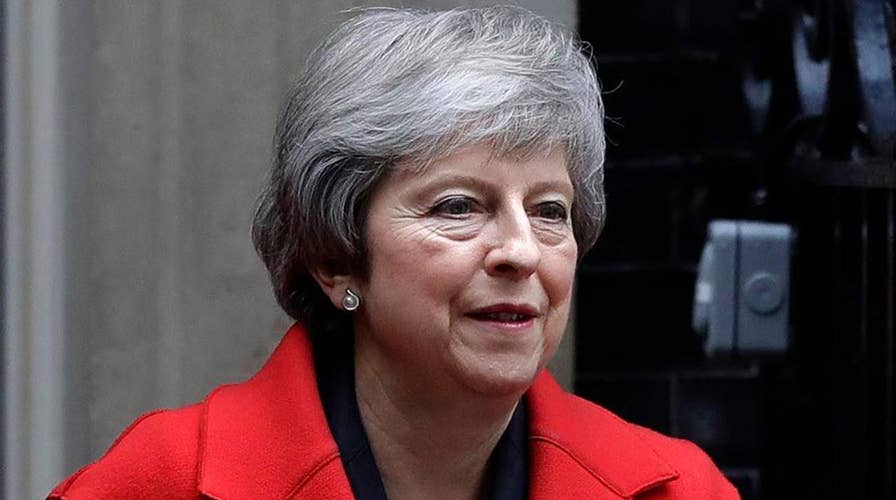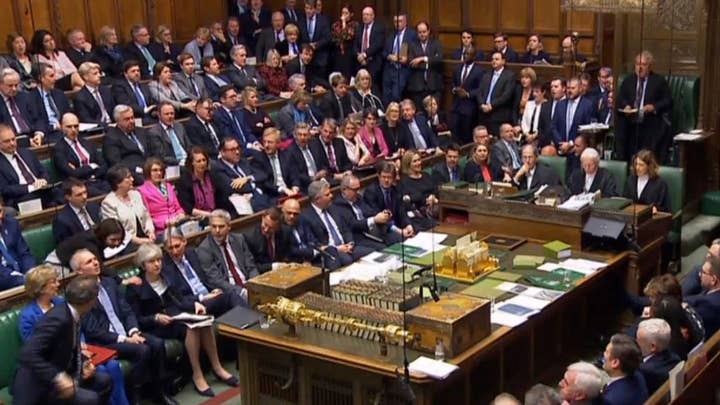British PM Theresa May in fight to save her premiership ahead of no-confidence vote
May, Brexit face uncertain futures after prime minister's plan defeated in parliament; Benjamin Hall reports from London.
Embattled British Prime Minister Theresa May will face a fresh vote of no-confidence on Wednesday, a day after suffering a devastating defeat on her Brexit deal -- as calls to delay Britain’s departure from the bloc intensify.
May’s withdrawal agreement, negotiated with E.U. leaders, was voted down 432-202 on Tuesday, the largest defeat for a sitting government in the history of the House of Commons. May had been expected to lose, but the enormous defeat marked a significant blow to her already-troubled time as leader.
BRITISH PRIME MINISTER THERESA MAY SUFFERS DEVASTATING DEFEAT ON KEY BREXIT VOTE
It immediately led to Labour Party leader and leader of the opposition Jeremy Corbyn tabling a motion of no confidence in the government. On Wednesday, he formally moved the motion.
“Last week they lost a vote on the finance bill, that’s what’s called supply. Yesterday they lost a vote by the biggest margin ever, that’s what’s regarded as confidence," he said. “By any convention of this House, by any precedence, loss of confidence and supply should mean they do the right thing and resign.”
On Tuesday, he said that "her governing principle of delay and denial has reached the end of the line."
"She cannot seriously believe that after two years of failure she is capable of negotiating a good deal for the people of this country. The most important issue facing us is that the government has lost the confidence of this House and this country," he said.
It is May’s second confidence vote in a month. While the motion Wednesday is a parliamentary vote of no-confidence in the government as a whole, last month she faced a vote of no-confidence from within her Conservative Party in her leadership of the party. She narrowly won that vote 200-117 and cannot be challenged by the party until December 2019.
Despite the historic defeat on Tuesday, May is widely expected to fend off the no-confidence motion on Wednesday evening. Her own Conservative Party is unlikely to vote against its own government, while the blocs of her main opponents within government have said they will not vote against the government.
The European Research Group, a backbench group of pro-Brexit MPs who have been critical of May’s handling of the Brexit negotiations, said they will vote in favor of the government. Meanwhile, the Democratic Unionist Party -- May’s coalition allies -- have also said they will back the government despite voting against the Brexit deal on Tuesday. Unless there is a last-minute defection of Tories, the government is likely to hold.
But should May's government survive as expected, it still is unclear what the future holds for Brexit. Britain is scheduled to leave the bloc on March 29, at the moment without a withdrawal agreement with the E.U. While some on the pro-Brexit wing have argued that Britain would simply revert to World Trade Organization terms, others in the government and in the opposition have predicted chaos at ports and across the country should that occur.
May said Wednesday that she is pushing forward with a cross-party initiative, in which she would seek support from Labour MPs for an alternative deal, one that could likely lead to a compromise “softer Brexit.”
“The exercise that I indicated last night is, as I said, about listening to the views of the House, about wanting to understand the views of parliamentarians so we can identify what could command the support of this House and deliver on the referendum,” she said.
Many of those who were in favor of remaining in the E.U. during the 2016 referendum are now calling for Britain’s departure to be delayed via an extension of Article 50 -- the trigger by which Britain's departure was put in place -- and also a second referendum.
"Firstly, and most urgently, the clock must be stopped on the Article 50 process,” Scottish National Party leader Nicola Sturgeon told the BBC. “This is the only way to avoid any possibility of the UK crashing out of the EU on 29 March without a deal.”
"Secondly, legislation must be brought forward to put this issue back to the electorate in another referendum,” she said.
On the Remain side, Liberal Democrat leader Vince Cable said in a statement that the vote marked "the beginning of the end of Brexit."
"With Parliament in deadlock, it is time to go back to the public," he said, a reference to calls for a second referendum.
These calls are likely to only fuel fears of a Brexit betrayal by “Brexiteers,” and a trend seen by Eurosceptics in which countries are made to vote again and again on a Europe issue until they vote the “right” way as determined by pro-European leaders. Steve Hilton, a former strategist for Prime Minister David Cameron, wrote in an op-ed for Fox News Wednesday that "there is no majority in parliament for any particular version of Brexit."
UK VOTE ON THERESA MAY'S BREXIT DEAL: WHAT TO KNOW
"But there is a majority, which includes representatives from both main parties, to stay in the E.U. And so we can expect a group of legislators to try and delay, and then overturn Brexit."
On Tuesday evening, top pro-Brexit MP Jacob Rees Mogg told the BBC that May “ought to go back to Brussels and say: ‘if we can’t agree anything in the interim, that is what will happen.’”
Corbyn has previously indicated that an extension of Article 50 may be needed, and his fellow Labour Party MPs made similar calls on Wednesday. But on Wednesday May ruled out revoking Article 50, although she didn’t directly address the idea of delaying it.
CLICK HERE FOR THE FOX NEWS APP
“[Revoking Article 50] would mean staying in the European Union, failing to respect the results of the referendum and that is something that this government will not do,” she said, to cheers from her backbenchers






